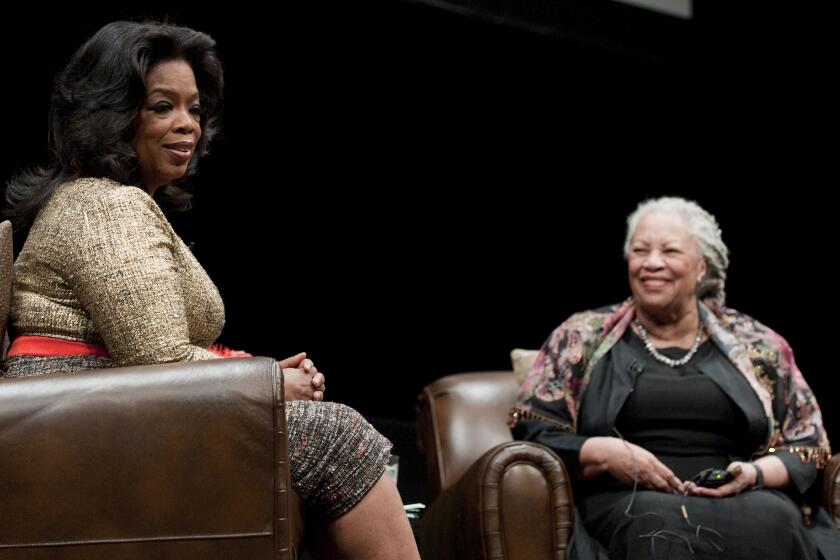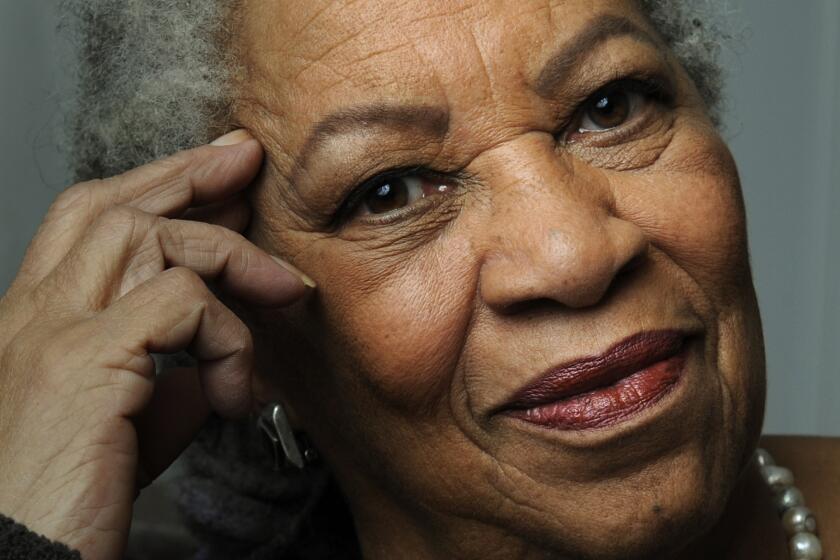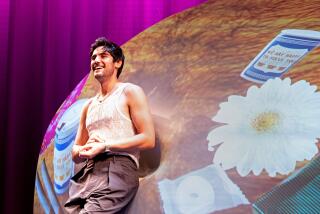Filmmaker says Toni Morrison was wickedly funny and made a mean carrot cake
- Share via
Novelist and book editor Toni Morrison was a private person who never wrote a memoir and turned away biographers, according to her friend Timothy Greenfield-Sanders. But she did allow the photographer-director to interview her extensively for the documentary “Toni Morrison: The Pieces I Am,” which explored her life as well as elements of black history.
After Morrison died late Monday at 88, Greenfield-Sanders — who was also the writer’s “photographer of choice” for her book jackets and publicity shots — opened up to The Times exclusively via email about his memories of her. He remembers her as a woman who saw the big picture and, even in dark times, “managed to be philosophical.”
With “Beloved” and other writings, Toni Morrison gave voice to the silences in the past and created some of the most memorable characters in American literature.
For those who missed the Oscar-buzzy documentary the first time around, encore screenings of “Toni Morrison: The Pieces I Am” are being held for a week beginning Aug. 16 at the Laemmle Music Hall in Beverly Hills and Aug. 17 and 18 at Laemmle’s Claremont 5 in Claremont and Playhouse 7 in Pasadena.
Here are some of Greenfield-Sanders’ memories from his decades-long friendship with the Nobel Prize winner.
Describe the type of friendship you had with Toni Morrison. What was it like?
I first met Toni Morrison 38 years ago, in the winter of 1981, when she came to my East Village studio for a Soho Weekly News cover portrait. She wore a dark suit with a white blouse and smoked a pipe. (Many years later she told me that Angela Davis had gotten her “into pipes.”) I was a young photographer and Toni had just finished her fourth novel, “Tar Baby.” I was impressed by her confidence on the set. Toni liked my work and we became friends … and I eventually became her photographer of choice, for book jackets, publicity photos and the like. Her trust in me began way back then.
Can you share something that most people don’t know about her?
Did you know Toni makes the world’s greatest carrot cake? Ask anyone who has tasted one of her carrot cakes and they will tell you. In the film, author Paula Giddings shares that during her early days working in the secretarial pool at Random House, Toni asked her to do some typing for her first novel, “The Bluest Eye.” As a thank you, Toni baked her a carrot cake.
Toni Morrison, the author, essayist and winner of Nobel and Pulitzer prizes, famously encouraged would-be writers to take action.
What is the most profound or useful thing you learned from her over the course of your friendship?
Toni had a way of looking at the big picture. Even in dark times she managed to be philosophical.
Talk a little about the things you filmed during your documentary interview that didn’t make the cut.
In creating “Toni Morrison: The Pieces I Am,” the most difficult challenge was cutting it down to a two-hour film. We had to edit out a riveting section about Morrison on Shakespeare and her play “Desdemona,” wonderful insights into her father and his influence on her, and an emotional piece about the death of writer Toni Cade Bambara. When Bambara died with an unfinished book, Toni [Morrison] devoted a year to finishing it so it could be published posthumously for her dear friend.
What did you learn about her legacy in researching the film?
At the beginning of the film, Toni remarks that she learned early on in life that “words have power.” As we’ve taken the film out, I’ve been able to see the depth of gratitude for her words. Her writing has empowered and nourished so many around the world … to heal, to imagine, to develop their own voices. Toni was a pioneer — taking her hard-earned place alongside the white men who had dominated the publishing establishment. Her ascent to the literary canon was a significant breakthrough that allowed other women and African Americans to be seen and heard.
Former President Barack Obama crafted a powerful tribute to late author Toni Morrison, whom he honored with the Presidential Medal of Freedom in 2012.
Some people don’t like to have their picture taken. What was it like to photograph her? How was it the same as or different from filming her?
Toni’s strength and confidence were part of her DNA, and both were particularly evident when she was in front of the camera. I think she had a profound understanding of portraiture and her image in the world. Our photo sessions were not only quite fun over the years but also resulted in big ideas for my own career. It was during a lunch break in 2005 that Toni proposed a book on “Black Divas”… we were shooting portraits for her opera, “Margaret Garner.” That idea morphed into my film series on identity, starting with “The Black List: Volume 1,” focusing on the African American community. Toni was the first to sit for that film.
Did she make you laugh?
Toni had a world-class sense of humor. Being with Toni was a lot of fun. Many people who only know her through her books and interviews don’t realize how much Toni loved to laugh. She was wickedly funny in addition to being such a profound, philosophical and visionary thinker.
More to Read
Sign up for our Book Club newsletter
Get the latest news, events and more from the Los Angeles Times Book Club, and help us get L.A. reading and talking.
You may occasionally receive promotional content from the Los Angeles Times.










